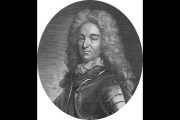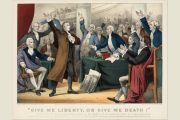
On December 4, 1783, at Fraunces Tavern, the popular public house located at the corner of Pearl and Broad Streets in Manhattan, General George Washington delivered the first of his many farewells.
The parties with American dignitaries were finished, the hands of local leaders were shaken, the celebratory fireworks were shot, the last stragglers of the British army had set sail for England, and the city was left in the management of Governor Clinton’s civil government and under the protection of the small American army (about 500 men) as yet under the command of the already-heroic and terribly exhausted General George Washington.
Anxious to get some road behind him in the daylight, Washington awoke earlier than usual, and in turn woke his host and asked Fraunces to prepare the Long Room for a luncheon for the general and his officers to be held that day at noon.
Washington entered the Long Room at the stroke of 12:00 and found the room packed to capacity by a devoted and admiring corps of officers. Washington was dressed in his best uniform (blue with buff trim and bright brass buttons). He quickly surveyed the faces that in turn focused, each and every one, on the face of their commander and the man universally considered the liberator of a nation. For his part, Washington recognized and rejoiced that all men in attendance were in word and deed officers and gentlemen, for they had all sacrificed to the furthest extent of their means and endured a roster of remarkable hardships together as brothers-in-arms. No exceptions, not even the general himself.
As always, the assembled veterans deferred to their commanding officer, waiting for his signal to begin eating the cold cuts and drinking the brandy wine set out dutifully by Fraunces. Washington, filled with fraternal affection for his fellow officers, motioned for the men to tuck in to the fare and fill their glasses.
As wine was poured into the last glass, Washington swallowed hard, inclined his head as if simultaneously suppressing tears, and focused his swirling thoughts. Then, with some effort to overcome the emotion, he raised his glass with his right hand, noticeably choked back tears, and offered the following heartfelt toast that was as dignified and inspiring as the speaker himself.
“With a heart filled with love and gratitude, I now take leave of you. I most devoutly wish that your latter days may be as prosperous and happy as your former ones have been glorious and honorable.”
The men tried clumsily to clink glasses, as they were overcome with melancholy at the thought of never seeing their retiring commander again.
Washington’s eyes welled with tears that testified to his genuine emotion, and he asked the congregated soldiers to “come and take me by the hand.” Obediently, one by one beginning with the portly and powerful hero of Ticonderoga, Henry Knox (he being the senior officer), the solemn soldiers approached Washington, clasped his hand, and kissed him on the cheek in an unashamed display of manly filial admiration. The details of this touching tableau were described in a letter by one of the attendees, Lieutenant Colonel Tallmadge of the Second Continentals:
Such a scene of sorrow and weeping I had never before witnessed…. It was too affecting to be of long continuance — for tears of deep sensibility filled every eye — and the heart seemed so full, that it was wont to burst from its wonted abode. The simple thought that we were then about to part from the man who had conducted us through a long and bloody war, and under whose conduct the glory and independence of our country had been achieved, and that we should see his face no more in this world seemed to me utterly unsupportable.
After individually embracing and saluting each of his men, General George Washington turned to exit the Long Room and paused at the door to wave goodbye for the last time. Washington’s plan to leave early was vexed by the tearful and emotionally wrenching farewell gathering at Fraunces Tavern. He would leave that scene, albeit reluctantly, and walk back to the home where he was staying to rest in anticipation of setting out for Philadelphia early the next morning. Time was slipping away, and he would suffer no delay in his appointed course, despite undoubtedly being spent by the poignant events of the day.




